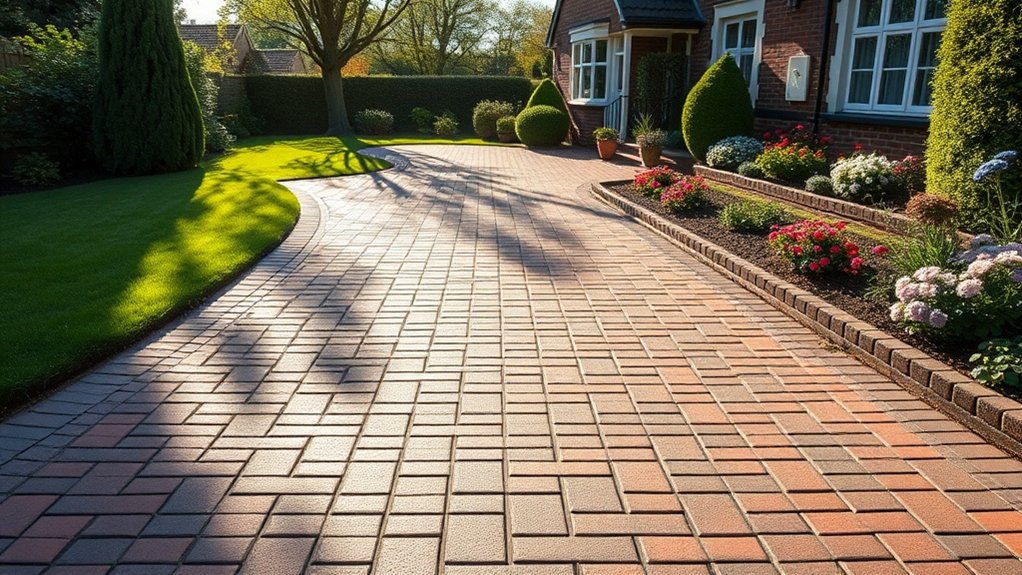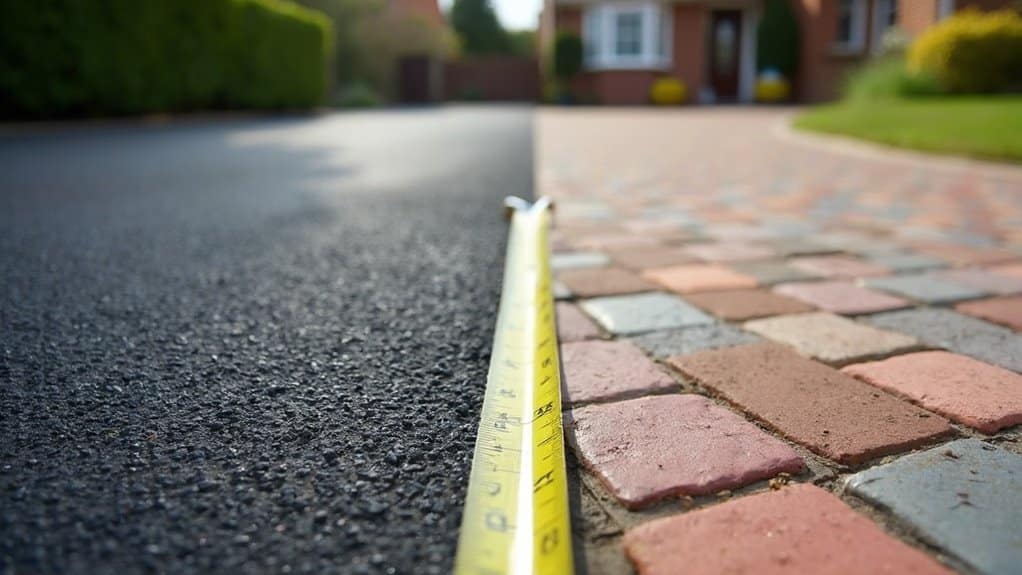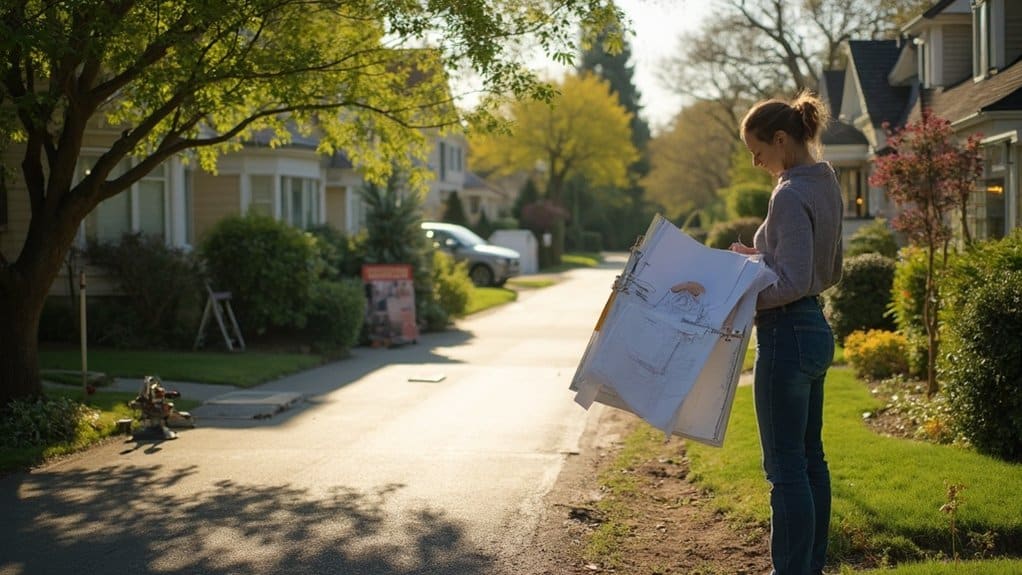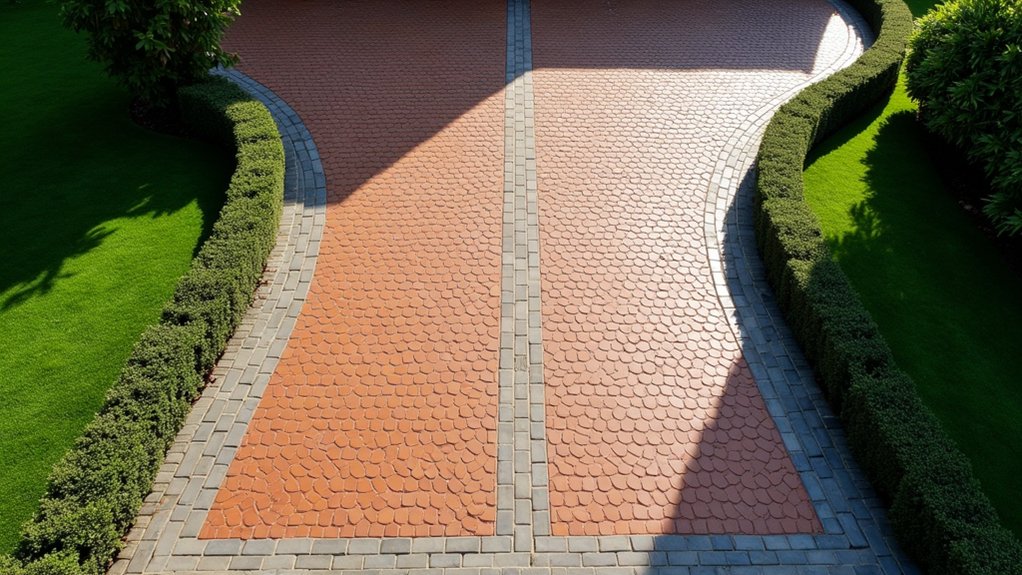In the UK, you may need planning permission for block paving driveways if they exceed 5m² and use non-porous materials. If you’re widening an existing driveway or creating a dropped kerb, you’ll typically need approval from your local council. Properties in conservation areas or on classified roads may have stricter regulations. It’s always best to check with your local planning authority to ensure you’re compliant. For further details on specific requirements and the application process, be sure to look into it.
Table of Contents
ToggleKey Takeaways
In the UK, planning permission is necessary for driveways exceeding 5m² that use non-porous materials. If you’re widening an existing driveway or installing a dropped kerb, you’ll likely need approval from your local council. Properties located in conservation areas may face additional planning stipulations for block paving. It’s important to check your local authority’s regulations, as they can vary by location. Additionally, ensure you comply with drainage regulations to avoid penalties and enforcement actions.
Understanding Permeable Surfaces in Block Paving
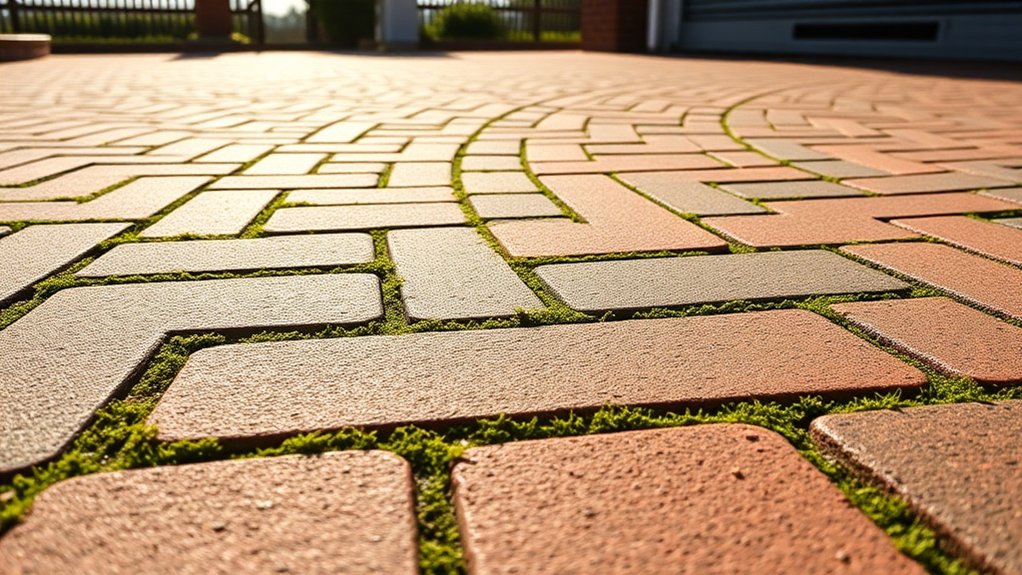
When choosing block paving for your property, it’s important to recognise the advantages of permeable surfaces.
Permeable paving features wider joints filled with aggregate, allowing rainwater to drain effectively. This design is a key part of sustainable drainage systems (SuDS), which help manage rainwater naturally by storing and gradually releasing excess water. Additionally, these systems contribute to groundwater recharge, which is vital for maintaining healthy ecosystems.
The open-graded sub-base, with around 30% voids, absorbs water and reduces surface runoff, which can help lower the risk of flooding and pollution in local waterways. Moreover, proper ground conditions assessment is necessary before construction to ensure the selected permeable paving option is suitable for your site.
Furthermore, this system benefits trees by improving irrigation and gas exchange.
To ensure you select the right permeable paving option, it’s essential to assess the ground conditions properly. This choice not only enhances your property but also contributes to a more sustainable environment.
Planning Permission Requirements for Driveways
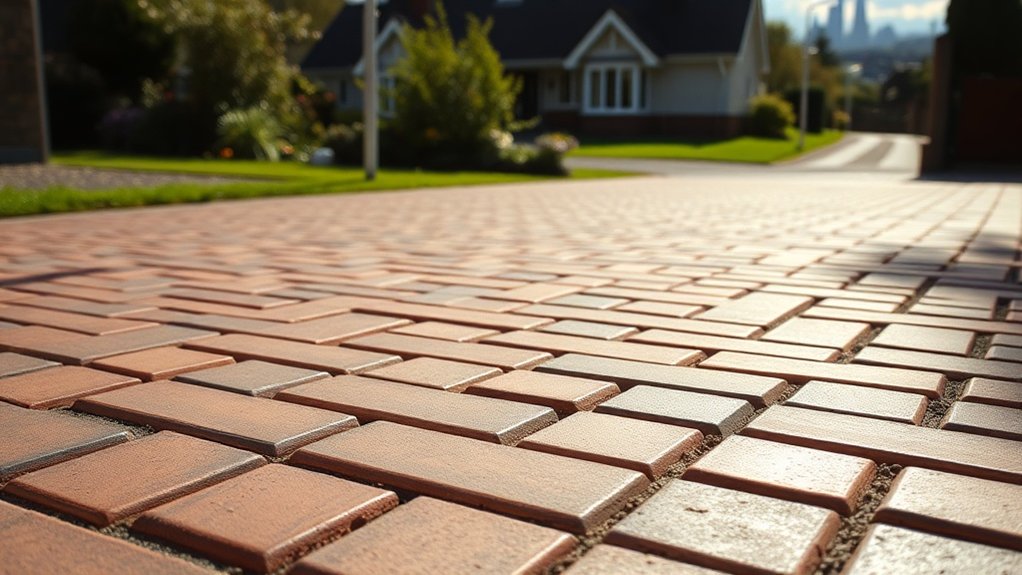
Before starting your driveway project, it’s crucial to understand the planning permission requirements that may apply.
If you’re building a new driveway or changing access to a public road, you’ll likely need permission from your local council. Widening an existing driveway, particularly if it involves removing boundary features like fences or hedges, can also require approval.
If your driveway is larger than 5m² and uses non-porous materials, you’ll definitely need planning permission. It’s important to note that planning permission is essential for regulating land use in the public interest. Additionally, compliance with local council regulations ensures your project adheres to safety and environmental standards.
It’s a good idea to speak with your neighbours about your plans, as addressing any concerns early can help smooth the approval process.
If your design includes permeable surfaces, you mightn’t need permission, but ensure your project follows local regulations to avoid any enforcement issues later on.
Types of Block Paving Materials
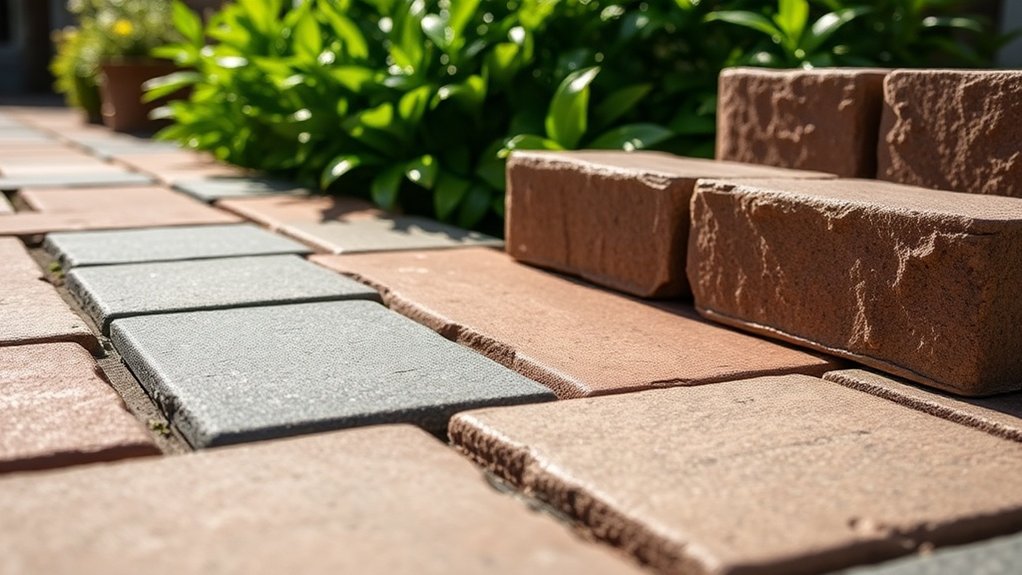
Block paving materials come in various types, each offering unique benefits and visual appeal for your outdoor projects. Knowing these types will help you select the right one for your needs.
| Block Type | Benefits |
|---|---|
| Concrete Block Paving | Highly durable, low maintenance, and available in a range of colours and finishes. |
| Clay Block Paving | Timeless look, naturally porous, and incredibly durable with proper care. |
| Natural Stone Paving | Distinctive textures, frost-resistant, and perfect for areas with heavy foot traffic. |
Each material has its advantages: concrete is hardwearing, clay brings a rustic touch, and natural stone adds elegance. Additionally, block paving is known for its exceptional durability and longevity, making it an ideal choice for high traffic areas. Porcelain paving blocks are also a great option due to their low maintenance and durability. Think about your project’s requirements and personal style when choosing the best option for your outdoor space.
Environmental Impact of Block Paving
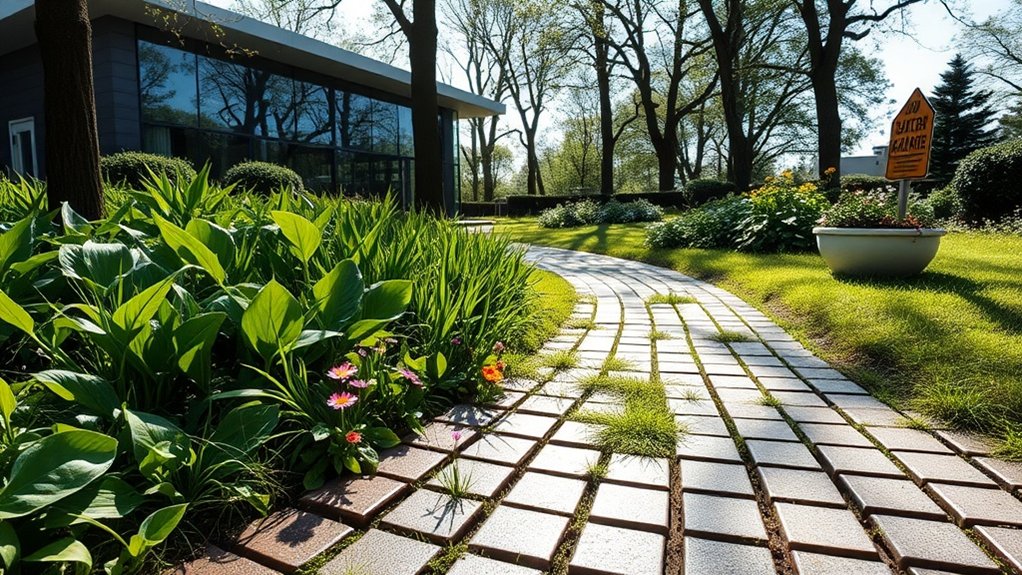
When considering block paving, it’s important to recognise its role in reducing flood risk and improving water drainage.
By allowing water to seep through its surface, block paving cuts down on surface runoff and helps prevent local flooding. This practical solution not only aids in water management but also supports the health of nearby ecosystems.
For instance, in areas prone to heavy rainfall, using block paving can make a noticeable difference in how water is managed, protecting homes and roads from excess water.
Flood Risk Mitigation
Flood risk mitigation is crucial in urban planning, particularly as traditional block paving creates impermeable surfaces. These surfaces increase surface runoff, which can overwhelm drainage systems and lead to flooding and water pollution.
To tackle this, we need effective flood prevention strategies that manage urban runoff and protect our waterways.
Using permeable block paving and Sustainable Drainage Systems (SuDS) can significantly reduce runoff by allowing rainwater to soak into the ground. For example, directing rainwater towards permeable areas helps lower flooding risks and supports local wildlife.
Current government proposals aim to limit impermeable surfaces to areas smaller than 5m², encouraging the use of eco-friendly paving solutions.
Water Drainage Solutions
Effective water drainage solutions are crucial for minimising the environmental impact of block paving.
Opt for permeable paving, which allows water to seep into the ground, significantly reducing surface runoff.
Installing linear or channel drains along the edges can help collect water effectively, while soakaways work well in areas with good soil drainage.
Perforated drainage pipes can also redirect excess water away from surfaces, and inspection chambers provide easy access for maintenance.
Using sustainable materials, like recycled steel for drainage systems, supports eco-friendly practices.
The Application Process for Planning Permission

Before starting your block paving project, it’s crucial to understand the planning permission process. First, get in touch with your local planning authority (LPA) to check if you need permission, particularly if you’re creating new access points or making significant changes.
Familiarise yourself with the application guidelines, which include permitted development rights and any local restrictions.
Prepare detailed site plans that include the driveway dimensions, materials you’ll use, and drainage solutions if necessary.
Once your documentation is in order, submit your application form along with supporting documents and the required fee. Ensure you meet local deadlines for submission.
The LPA will review your application and usually respond within eight weeks. They’ll consider local policies and any environmental impacts before making a decision.
Additional Considerations for Driveway Construction
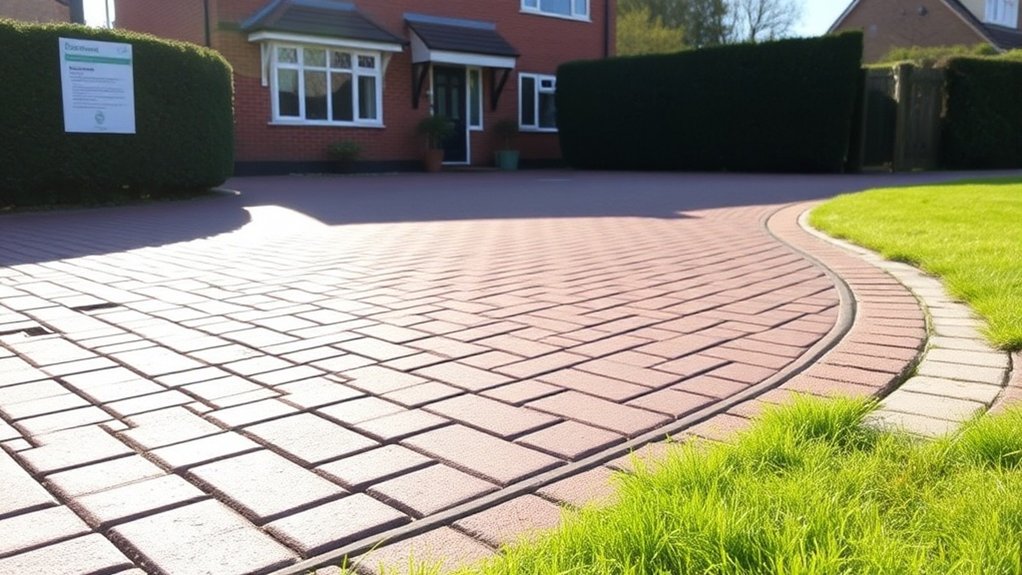
When planning your driveway construction, it’s crucial to consider permissions for any fences or walls you plan to install.
If you’re changing a dropped kerb or creating new access points, check local regulations for compliance.
Be aware that different local authorities may have specific requirements that can impact your project, so ensure you’re informed about what’s needed in your area.
Fences and Walls Permissions
When planning your driveway construction, it’s important to understand the permissions needed for any fences or walls.
Generally, fence regulations allow a maximum height of 2 metres, but only 1 metre if you’re adjacent to a highway. If your property is near a listed building or in a conservation area, you may need special permissions.
Wall guidelines follow similar height restrictions and stress the need for structural integrity. Ensure your installations don’t block visibility for drivers, particularly at junctions.
Most changes may not require planning permission if they meet these criteria, but it’s wise to check with local authorities for specific regulations in your area.
Dropped Kerb Regulations
To install a dropped kerb for your driveway, you need to follow specific regulations set by local authorities. A licence is required for creating or widening a dropped kerb, and you must get approval from your local highway authority before starting any work.
Expect to pay application fees, which typically include a non-refundable assessment fee and a construction licence fee.
Ensure that your contractor is certified under the New Roads and Street Works Act and has the necessary public liability insurance.
If your property is on a classified road or located in a conservation area, you may also need planning permission.
Adhering to these regulations helps ensure your dropped kerb is installed safely and legally, avoiding any potential fines or enforcement issues.
Local Authority Variations
Local authorities can set specific rules for driveway construction, so it’s important to know the guidelines in your area.
In flood-prone regions or areas sensitive to groundwater, you may face stricter drainage requirements. While permeable surfaces usually don’t need planning permission, some councils have their own rules that might require approval even for these materials.
Always check for any Article 4 Directions or specific conditions that apply to your property type.
If your driveway covers more than 5m² with impermeable materials, you’ll need planning permission unless you have adequate drainage in place.
Make sure to verify local restrictions before starting your project to avoid any enforcement actions or fines.
Frequently Asked Questions
Can I Install Block Paving Without a Professional Contractor?
Yes, you can install block paving yourself without hiring a professional contractor. Just be sure to pay attention to safety, use the right materials, and follow proper techniques to prevent problems like uneven surfaces or poor drainage. For example, ensure the ground is level and well-compacted before laying the blocks. With careful planning and execution, DIY block paving can be a rewarding project.
How Does Block Paving Affect Property Value?
Block paving can boost your property value by as much as 10%. It enhances the overall appeal of your home, making it more attractive to potential buyers. For instance, a well-paved driveway or patio can significantly improve first impressions, which is crucial in the competitive UK housing market. This investment not only helps with marketability but also ensures a good return on your property.
What Maintenance Is Required for Block Paving?
To maintain block paving effectively, regularly sweep and clean it with a stiff-bristled brush and hot, soapy water. Control weeds by pulling them out by hand or using appropriate chemicals. Ensure the joints remain stable by re-sanding annually and sealing every 2 to 3 years.
Are There Any Aesthetic Restrictions on Block Paving Designs?
In the UK, there are no national aesthetic restrictions on block paving designs. You can experiment with different patterns and colours. However, it’s wise to check local guidelines, particularly in conservation areas where specific rules may be in place. For example, if you’re in a historic district, you might need to use certain materials or colours to maintain the area’s character.
How Long Does Block Paving Installation Typically Take?
Block paving installation usually takes between 1 to 2 weeks, depending on the size and complexity of the project. For a typical driveway, you can expect it to take around 4 to 8 days, which includes preparation time and potential delays due to weather.
Conclusion
In summary, while block paving can improve your property’s appearance, it’s vital to understand the planning permission requirements. A well-paved driveway might come with unexpected legal issues if you don’t adhere to regulations. By being aware of the rules and considering environmental factors, you can ensure your project is both compliant and eco-friendly. So, before you start laying those blocks, ask yourself: is the potential hassle worth it?
Looking for an affordable driveway option? Discover the cost differences between tarmac and block paving that could impact your decision.
Know the essential steps to secure planning permission for your tarmac driveway—discover key insights that could save you time and Read more
Get inspired by the best block paving patterns for driveways that blend style and durability; discover which layout will elevate Read more

